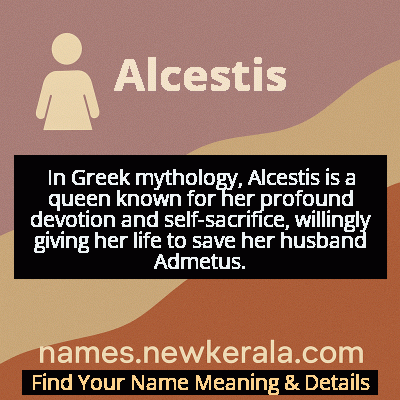Alcestis Name Meaning & Details
Origin, Popularity, Numerology Analysis & Name Meaning of Alcestis
Discover the origin, meaning, and cultural significance of the name ALCESTIS. Delve into its historical roots and explore the lasting impact it has had on communities and traditions.
Name
Alcestis
Gender
Female
Origin
Greek
Lucky Number
7
Meaning of the Name - Alcestis
In Greek mythology, Alcestis is a queen known for her profound devotion and self-sacrifice, willingly giving her life to save her husband Admetus.
Alcestis - Complete Numerology Analysis
Your Numerology Number
Based on Pythagorean Numerology System
Ruling Planet
Neptune (Ketu)
Positive Nature
Intuitive, analytical, spiritual, and inquisitive.
Negative Traits
Secretive, reserved, aloof, and can be overly critical.
Lucky Colours
Green, yellow.
Lucky Days
Monday.
Lucky Stones
Cat’s eye, moonstone.
Harmony Numbers
1, 5, 6.
Best Suited Professions
Scientists, researchers, spiritual leaders, detectives.
What People Like About You
Depth of knowledge, analytical skills, spirituality.
Famous People Named Alcestis
Alcestis of Greek Myth
Mythological Queen
Volunteered to die in place of her husband Admetus, then rescued by Hercules from the underworld
Alcestis 'Cissy' O'Connor
Australian Actress
Prominent Shakespearean actress in Australia and founder of the Sydney Repertory Theatre
Alcestis R. Oberg
American Science Writer
Award-winning science journalist and author of numerous books on space exploration
Alcestis Cook
British Classical Scholar
Renowned translator and interpreter of Greek tragedy, specializing in Euripides
Name Variations & International Equivalents
Click on blue names to explore their detailed meanings. Gray names with will be available soon.
Cultural & Historical Significance
Throughout history, Alcestis has been interpreted as both a feminist icon and a patriarchal ideal, reflecting changing societal views about marriage and gender roles. During the Victorian era, she was celebrated as the perfect embodiment of wifely sacrifice, while 20th-century feminist readings have highlighted her agency and the problematic nature of her sacrifice. The character's enduring appeal lies in her complexity—she is both powerful and vulnerable, traditional and revolutionary. Her story continues to resonate because it speaks to universal human experiences of love, loss, and the hope for redemption.
Extended Personality Analysis
Individuals named Alcestis are often perceived as profoundly loyal, self-sacrificing, and courageous. They typically possess a strong sense of duty and are willing to make significant personal sacrifices for those they love. This name carries an inherent nobility and strength of character, suggesting someone who faces adversity with grace and determination. Alcestis-named individuals often exhibit emotional depth and resilience, capable of enduring great challenges while maintaining their integrity.
These individuals tend to be protective of loved ones and may display a quiet, understated strength rather than overt power. The mythological association suggests someone who understands the value of life and relationships deeply, often serving as the moral center in their social circles. Their courage is not of the battlefield variety but rather the quiet, profound bravery of everyday devotion and sacrifice. They are often drawn to helping professions or roles where they can make a meaningful difference in others' lives, embodying the name's legacy of service and compassion while maintaining a strong sense of self-worth and personal boundaries.
Modern Usage & Popularity
Alcestis remains a rare but meaningful choice in modern naming, primarily selected by parents with classical education or interest in Greek mythology. The name has never ranked in the top 1000 names in the United States, maintaining its status as an uncommon but distinguished choice. It sees occasional use in academic and artistic circles, where its literary and mythological significance is appreciated. In recent years, there's been a slight increase in usage as parents seek unique names with deep cultural roots and strong female associations. The name is particularly popular in Greece and among Greek diaspora communities, where it maintains its original cultural context. Modern bearers often appreciate the name's combination of classical elegance and feminist undertones, though some may choose nicknames like 'Allie' or 'Cessy' for everyday use. The name's rarity ensures that bearers stand out while carrying a rich historical and literary legacy.
Symbolic & Spiritual Meanings
Alcestis symbolizes the ultimate sacrifice born of love—the willingness to give one's life for another. She represents the transformative power of devotion and the possibility of redemption through love. The character embodies the concept of 'agape' love, the selfless, sacrificial love that seeks nothing in return. Symbolically, Alcestis represents the journey through darkness and return to light, making her a powerful emblem of resurrection and second chances. Her story serves as a metaphor for the human capacity to overcome death through love and memory, representing the idea that true love can conquer even the finality of death. In psychological terms, she represents the archetype of the self-sacrificing caregiver and the transformative journey through suffering to renewal. The name carries connotations of loyalty that transcends even death, making it a powerful symbol of eternal devotion and the enduring power of love in the face of mortality.

